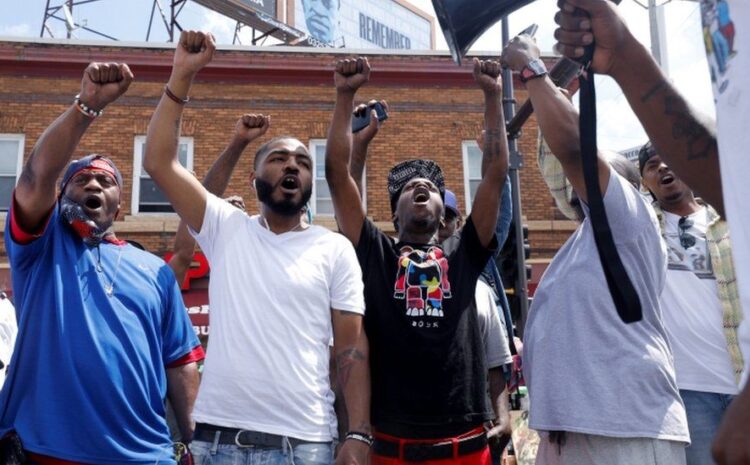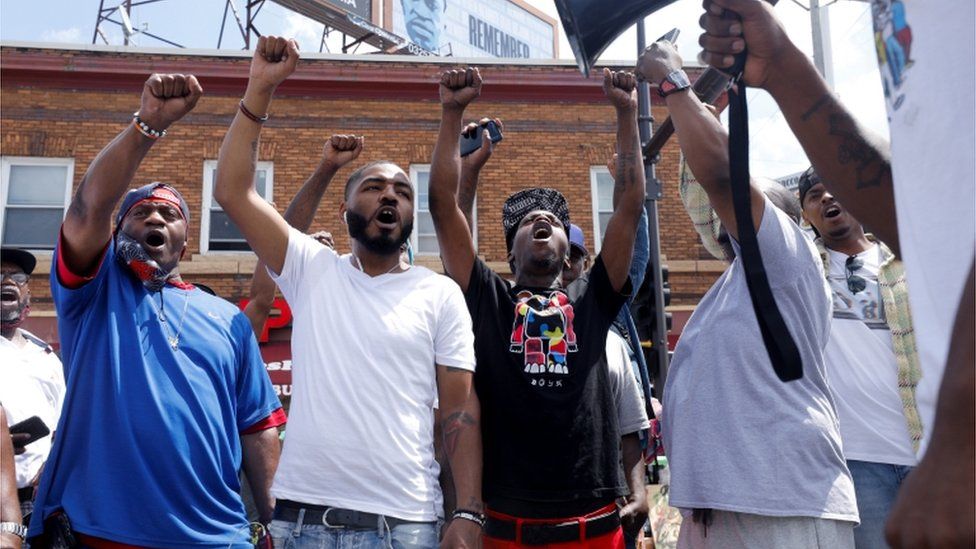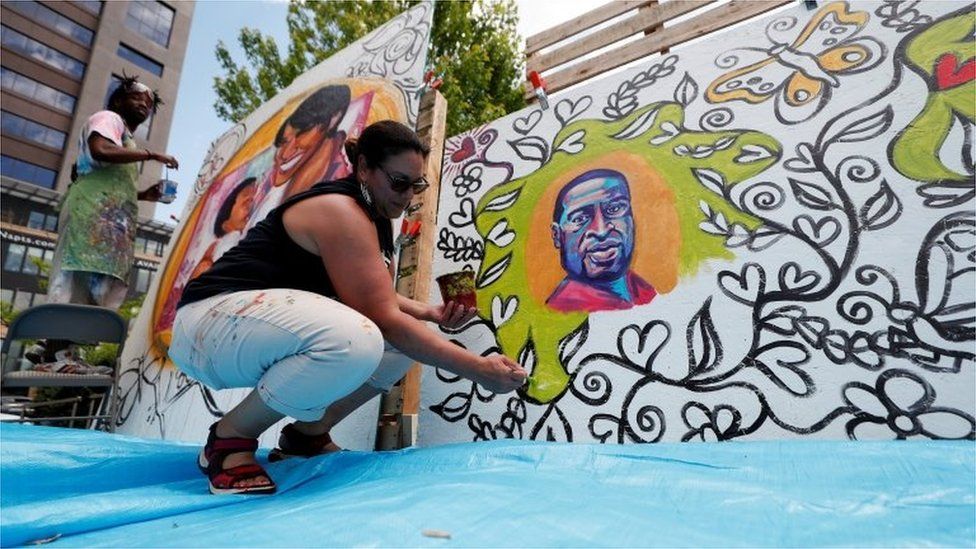
REUTERS image captionDemonstrations took place across the US, including in Minneapolis, where George Floyd was murdered
George Floyd’s sister has boycotted a meeting with US President Joe Biden, saying he “broke a promise” to enact police reform legislation by the anniversary of her brother’s death.
While Bridgett Floyd attended a rally in Minneapolis, Minnesota, other family members lobbied Mr Biden at the White House to help pass the bill.
The George Floyd Justice in Policing Act is stalled on Capitol Hill.
On Tuesday cities in the US and abroad marked a year since Floyd’s death.
Former Minneapolis police officer Derek Chauvin was convicted last month of the murder of Floyd, a 46-year-old black man, after kneeling on his neck area for more than nine minutes as he was detained on suspicion of passing a counterfeit $20 bill. He faces up to 40 years in prison when sentenced on 25 June.
Mr Biden had set Tuesday as a deadline for signing police reform legislation – exactly a year after Floyd’s death.
 IMAGE COPYRIGHT REUTERS
IMAGE COPYRIGHT REUTERSAfter meeting the president and Vice-President Kamala Harris at the White House, Floyd’s brother, Philonise, told reporters: “If you can make federal laws to protect the bird which is the bald eagle, then you can make federal laws to protect people of colour.”
But Bridgett Floyd – who instead held a moment of silence at a “Celebration of Life” event in a downtown Minneapolis park – explained why she did not go to Washington.
“I was going to DC for Biden to sign a bill,” she said. “Biden has not signed that bill. Biden has broke a promise.”
She added a message for the president: “Get your people in order.”
After meeting the Floyd family, the president issued a statement pledging to keep supporting the legislation.
While Mr Biden, a Democrat, has led the way in publicly lobbying for passage of infrastructure and coronavirus stimulus bills, he has left much of the negotiations over police reform to lawmakers on Capitol Hill.
 IMAGE COPYRIGHT REUTERS
IMAGE COPYRIGHT REUTERS“We have been respecting the space needed for negotiators to have these discussions,” White House press secretary Jen Psaki said on Tuesday as she declined to offer a new deadline for reaching an agreement.
But activists said Mr Biden needed to do more to help pass the bill.
“The president will need to step up to make sure we get it across the finish line,” Judith Browne Dianis, executive director of the Advancement Project, a racial justice organisation, told AP news agency.
Senate Democrats last June blocked a police reform bill proposed by a black Republican senator, Tim Scott of South Carolina. They argued it did not go far enough.
Mr Biden has also been pressed by Black Lives Matter and other activists to stop military equipment being supplied to police forces.
On the campaign trail last year, he called for the US to “stop transferring weapons of war to police forces”.
But despite calls from House Democrats to issue an executive order to that effect, the White House has not acted.
Legal cases surrounding Floyd’s murder continue, meanwhile.
Earlier in May a federal grand jury charged four ex-police officers – Alexander Keung, Thomas Lane and Tou Thao, as well as Chauvin – with violating Floyd’s civil rights.
Chauvin’s defence team has requested a new trial, accusing both prosecutors and jurors of misconduct.
How did the US mark the anniversary?
In New York City, Mayor Bill de Blasio joined civil rights activist Rev Al Sharpton in kneeling in silence for nine minutes and 29 seconds – the time that Chauvin knelt on Floyd.
Across the country, demonstrators gathered for a Black Lives Matter protest near City Hall in Los Angeles.
And in Minneapolis, many gathered at the intersection where Floyd took his last breaths, which has been turned into a memorial site.
Events at “George Floyd Square” were briefly interrupted by gunfire. One person was reported injured as at least 20 rounds were fired.
Minneapolis has been struggling with rising gun violence in the past year as nearly 200 officers in the city police department have resigned or gone on leave. A six-year-old girl was among those fatally shot in recent weeks.
There were also commemorative events on Tuesday for Floyd overseas.
Canadian Prime Minister Justin Trudeau told reporters his death was a “tragedy” and vowed to take more action in Canada to tackle racism.
Vigils and demonstrations also took place in cities across the UK, including Birmingham, Edinburgh, London, Manchester and Swansea.
